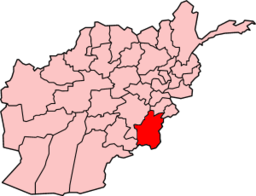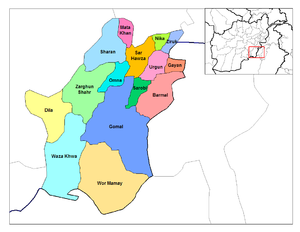Paktika Province
| Paktika (┘Š┌®ž¬█ī┌®ž¦) | |
| Province | |
| Country | |
|---|---|
| Capital | Sharan |
| - coordinates | |
| Area | 19,482 km┬▓ (7,522 sq mi) |
| Population | 393,800 (2009) [1] |
| Timezone | UTC+4:30 |
| Main language | Pashto |
 Map of Afghanistan with Paktika highlighted
|
|
Paktika (Pashto: ┘Š┌®ž¬█ī┌®ž¦) is one of the 34 provinces of Afghanistan. It is in the south-east of the country. Most of the population is Pashtun. Its capital is Sharan.
Contents |
Political and military situation
As one of the most remote provinces in Afghanistan, and in an area that saw much devastation in previous years, Paktika suffers from a severe lack of critical infrastructure. Reconstruction in the province after the fall of the Taliban has been slow in comparison to that in nearby provinces such as Khost and Zabul. This is primarily due to the remoteness of the region and repeated attacks on aid workers. In June 2004, members of the Utah and Iowa National Guard helped Army Reserve Civil Affairs Soldiers from Oregon establish a Provincial Reconstruction Team base in Gardez, capital of Paktia, to lead the development effort. The first full contingent of eight Civil Affairs Soldiers, from Maryland, arrived in September 2004.
In an article in Time Magazine, the U.S. base was described as:
- "The U.S. firebase looks like a Wild West cavalry fort, ringed with coils of razor wire. A U.S. flag ripples above the 3-ft.-thick mud walls, and in the watchtower a guard scans the expanse of forested ridges, rising to 9,000 ft., that mark the border. When there's trouble, it usually comes from that direction." [2]
The Shkin firebase is composed of special operations forces. They target and are constant targets for al-Qa'ida and Taliban fighters who launch frequent strikes from nearby Pakistan. The area is an unforgiving, where the enemy can hide at close range while remaining invisible. A hunter can become prey very quickly. As U.S. Army Colonel Rodney Davis puts it, "Shkin is the evilest place in Afghanistan." [3]
While the province hasn't witnessed the outright fighting in the last few years that has affected provinces like Helmand, there is a constant low level of tribal violence accompanied by criminal and Taliban activity. The last serious fighting in the province took place in 2004, amid reports that then-Governor Muhammad Ali Jalali was collaborating with Taliban forces, and that the Taliban had effectively annexed eastern portions of the province. Jalali, and many of his allied officials, were replaced, U.S. Special Forces were dispatched to fight the Taliban while the Pakistan forces fought with the Taliban's allies in neighbouring South Waziristan.[4]
On 1 November 2004, a civil affairs convoy was ambushed near Sarobi, between Shkin firebase and Orgun-E. U.S. Army Spc. James Kearney, a turret gunner, died of a head shot from a sniper, which initiated the ambush. After countless RPGs, PKM rounds and an IED, two vehicles were destroyed and three other Soldiers were wounded.[5] The Provincial Reconstruction Team base was named Camp Kearney on 21 November 2004 to honor the sacrifice of Spc. James Kearney.[6]
Kearney Base became the nucleus of what was to become Forward Operating Base Sharana, now the major U.S. military base in the region.
Politicians
The current Governor of the province is Akram Khpalwak. In 2006, a previous Governor of the province, Muhammad Ali Jalali, was killed by Taliban millitants while driving in neighbouring Ghazni Province.[7] In 2004, Ghulabuddin Mangal was appointed Governor of Paktika Province, replacing Muhammad Ali Jalali who left the governor's compound as ordered, but only after firing two rockets at it.
The Sulaimankhel are one of the largest sub-tribes of the Ghilzai Pashtuns. The Sulaimankhel tribe is mainly located in the southern and eastern portions of Afghanistan, however, they also have a strong presence in the northern and western portions of Afghanistan.
The second largest Sulaimankhel population is located in Pakistan. Not only are they located in the province of Baluchistan and the North-West Frontier Province, but also located in Karachi and other parts of Pakistan.
New official Sulaimankhel Social Tribal Council has been established in Kabul Afghanistan. Ayoub Khalikyar is the president of Sulaimankhel social Tribal Council.the other largest ethnic group of paktika is Kharoti.kharoti tribesmen live in karachi as well where they are engaged in carpets and fabric business. they have made a committee called kharoti committee led by Haji Juma Gul Kharoti.
The Khan of the Kharoti tribe living in Paktika is Mohammad Ayub, son of famous Khan Sahib Jan Khan. Some Kharoti tribesmen are living in Karachi, Pakistan. Another tribe of Paktika is Sulemankhel, who are the majority.
History
Paktika was once part of a greater province Paktia, which has itself now further split into Khost province. The province was the site of many battles during the Soviet occupation of the country and the lawless years that followed.
Geography
Paktika is bordered on the north by Paktia Province and Khost Province, and by North Waziristan and South Waziristan in the Federally Administered Tribal Areas of Pakistan to the east. The western border is shared with Ghazni Province and Zabul Province, while Balochistan, Pakistan is on its southern flank.
Like many areas of the country, Paktika has been heavily deforested. This has been one of the causes of devastating flooding in recent years.[8]
Demographics
The population of this province is 393,800 people in which over 96% people are Pashtuns.[9] The main Pashtun tribes are:
- Ghilzai
- Ibrahimzai
- Alizai
- Sulaimanzai
- Jalalzai
- Alikhel
- Boran
- Sulaimankhel
- Toran
- Kharoti
- Andar
- Ibrahimzai
- Karlanri
- Zadran
- Wazir
15000 people (1.8%) are Uzbeks; and about 5,000 people speak some other languages.[9] There was a small group of Tajiks in 1800s who practiced ironmongery, mostly in Urgun.[10][11]
Districts

| District | Capital | Population [9] | Area[12] | Notes |
|---|---|---|---|---|
| Barmal | 88,028 | |||
| Dila | 50,203 | |||
| Gayan | 42,495 | |||
| Gomal | 64,275 | |||
| Jani Khel | 35,251 | Created in 2005 within Zarghun Shahr District | ||
| Mata Khan | 19,758 | |||
| Nika | 15,103 | |||
| Omna | 25,690 | |||
| Sar Hawza | 36,236 | |||
| Sarobi | 48,291 | |||
| Sharan | 54,416 | |||
| Terwa | 15,332 | Created in 2005 within Waza Khwa District | ||
| Urgun | 89,718 | |||
| Waza Khwa | 50,818 | Sub-divided in 2005 | ||
| Wor Mamay | 30,135 | |||
| Yahya Khel | 30,161 | Created in 2005 within Zarghun Shahr District | ||
| Yosuf Khel | 32,648 | Created in 2005 within Zarghun Shahr District | ||
| Zarghun Shahr | 38,024 | Sub-divided in 2005 | ||
| Ziruk | 43,190 |
Cities
The city of Sharan is the capital. Serowza is one of the biggest districts.
See also
- Tribal Map of Paktika on nps.edu
- ISAF
- Provincial Reconstruction Team
- Pakthas
|
|||||||
|
|||||
|
||||||||||||||||||||||||
References
- Ōåæ Central Statistics Office of Afghanistan. "Settled Population of country by Provinces and sex for 2006-2009 years". http://www.cso.gov.af/demography/population.html. Retrieved 2009-11-30.
- Ōåæ Time. 27 October 2003. http://www.time.com/time/magazine/article/0,9171,526466,00.html. Retrieved 21 May 2010.
- Ōåæ Time. 27 October 2003. http://www.time.com/time/magazine/article/0,9171,526466,00.html. Retrieved 21 May 2010.
- Ōåæ The Washington Post. http://www.washingtonpost.com/ac2/wp-dyn/A58636-2004Mar14?language=printer. Retrieved 21 May 2010.
- Ōåæ [1]
- Ōåæ [2]
- Ōåæ [3]
- Ōåæ The Guardian (London). http://www.guardian.co.uk/worldlatest/story/0,,-6004712,00.html.
- Ōåæ 9.0 9.1 9.2 Paktika provincial profile
- Ōåæ http://books.google.com/books?id=kPdtAAAAMAAJ&q=tajiks+in+urgun&dq=tajiks+in+urgun&ei=08mJSsu9LoLckATK4ICCCg
- Ōåæ http://books.google.com/books?id=fAkEAAAAMAAJ&pg=PA126&dq=furmuli+tajik&ei=L9OJSvLjJ5ywkATombiECg#v=onepage&q=furmuli%20tajik&f=false
- Ōåæ Afghanistan Geographic & Thematic Layers